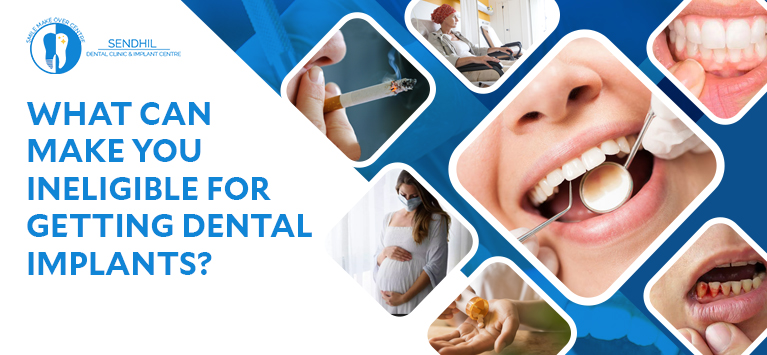
What can make you ineligible for getting dental implants?
Dental implant treatment is an excellent solution for replacing missing teeth. Besides reconstructing the damaged teeth that are beyond repair, full arches can also be revamped by fixing four or more implants throughout the jaw.
The fixed implant teeth are indistinguishable once they are embedded and can function like your natural teeth. Moreover, implants can prevent the harmful consequences of tooth loss like bone deterioration, facial sagging, chewing difficulties, speech impediments, etc.
Even though the majority of people want implant treatments to fill the gaps in their smile, people who have healthy oral cavity alone get dental implants. While assessing a patient’s oral health, the implant specialists take into account various factors to decide whether a patient is eligible for implants.
Here we have shared the important factors that can influence a person’s eligibility to get dental implants.
What are the possible eligibility complications that forbid a person from getting dental implants?
The gum health and jawbone play a dominant role in determining the success rate of an implant tooth. The fixed implant post should fuse well with the jawbone so that the implant can attain its stability and can last for years. Various aspects like oral habits, lifestyle, existing bodily disorders can indirectly affect the gums and jaw.
Your dentist will look for such things as they can compromise your dental health or intervene in the implant’s bone integration process.
1) Age
There is not an upper age limit for getting implants unless a person has healthy gums and jaw. Even an 80-year-old adult is eligible for full mouth rehabilitation treatments but dentists do not fix implants for individuals aged below 18. It is because the jaw bone is still developing so that its shape and size will increase in the future.
Hence dentists do not perform implant surgery for people below the specified age. Otherwise, the implant teeth intervene in facial development as well.
2) Gum disease
The gum tissues also help in keeping the fixed implants in their place. When a patient has periodontal disease, the oral bacteria kill gum tissues and is followed by the teeth losing their bone support. Similar to natural teeth, the implant teeth also become weak and lose their support when gum disease occurs.
Hence dentists temporarily hold on to the dental restorations for people with gum diseases until the gum infection treatments are completed.
3) Smoking
Chain smokers are not eligible for getting implants. It is because the toxic substances in cigarettes are powerful to block the salivary glands in our mouth. Saliva plays a crucial role in disinfecting teeth and oral tissues to prevent bacteria accumulation. Moreover, nicotine intervenes in oxygen and blood supply to the bone.
In essence, smoking leads to bacteria thriving and restricts the gum tissues from getting enough nutrients via blood. It affects the implant’s ability to concatenate with the bone.
This is the reason why dental doctors advise people to avoid smoking for a few months after implant surgery.
4) Pregnancy
Implantologists do not fix implant teeth for pregnant women for the baby’s well-being.
Similar to most dental procedures, implant surgery is also performed after administering local anesthesia. The anesthesia is powerful to affect the fetus development and it could end in miscarriage, premature birth, etc.
Hence most dentists postpone the implant treatment for expectant mothers and wait until the delivery.
5) Chemotherapy
The jaw bone mass is less for people who had chemotherapy treatments in maxillofacial regions, jaw, or neck. It means their jaw bone is less dense and thin so that the bone cannot support the implant teeth efficiently.
Apart from chemotherapy, various factors are also associated with jaw bone deterioration that restricts you from getting implants.
6) Health disorders & Medications
Aside from oral disorders, various health complications like diabetes, auto-immune diseases, cardiovascular diseases have harmful impacts on the jaw bone. For instance, TMJ pain is seen in many people who are suffering from such illnesses. Likewise, it lessens the jawbone’s ability to fuse with the implants fixed.
On the other hand, medications taken to combat some bodily disorders are also powerful to intervene in the osseointegration process. It dramatically reduces the success rate of implant treatments.
Bottom line
Whether it is a single tooth or full mouth rehabilitation, implant teeth deliver the exact restoration solution you want. At times, various things affect the jaw bone and restrict you from getting implants. Once you reveal your existing problems, the implantologists will look for additional solutions like bone grafting or alternatives like zygomatic implants as a part of the customized implant dental treatments.



